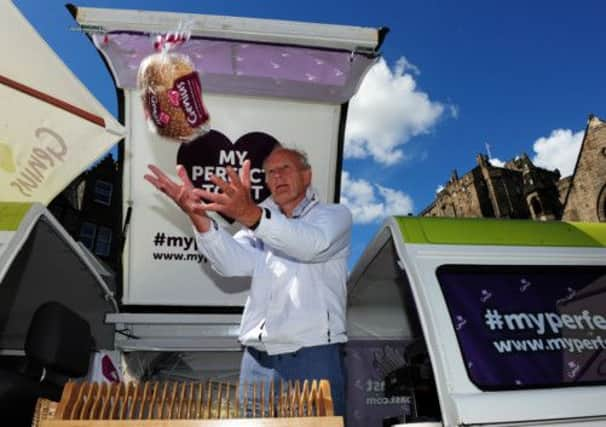Stroke of Genius changed my life, says Bill Gammell


After 35 years in the oil and gas industry, he is helping to nurture a young bakery company that has similar international ambitions.
Edinburgh-based Genius Foods has quickly come to dominate the gluten-free bread market as its products are increasingly regarded as a lifestyle choice beyond those diagnosed as coeliacs, a common digestive condition.
Advertisement
Hide AdAdvertisement
Hide AdGammell is a sufferer and so he not only mentors the small team running the company but also benefits personally from its products.
“It has changed my life dramatically because I can now eat bread in the morning and later in the day without any problems,” he says.
Gluten is in barley, rye and wheat and also commonly found in beer, crisps and ice-cream. Coeliac – pronounced “see-liac” – victims suffer from conditions such as bloating and energy loss. The tennis player Novak Djokovic claimed big changes in his performance after being diagnosed with the disease and changing his diet.
Last week Gammell was in Edinburgh’s Grassmarket, swapping his hard hat and windcheater for a white anorak to help serve free bread to passers-by. It was part of a nationwide promotion by Genius Foods to capitalise on its rising popularity.
With 50 per cent of the gluten-free market, it is now preparing to move into other products, and other territories. The firm has recently signed a deal to expand into the Australian market and is targeting group turnover of £50 million.
The firm’s £21m acquisition in March of Finsbury’s “Free From” unit included bakeries in Bathgate and Hull, giving it greater distribution and sales autonomy, while the size of the deal signalled its intent.
Founder Lucinda Bruce-Gardyne, whose family created the famous Lyons food empire, launched Genius in 2009 after her son was diagnosed as gluten intolerant. It affects about 1 per cent of the population, but increasingly gluten-free bread is appearing in restaurants and on supermarket shelves. Getting an initial deal with Tesco changed the company’s fortunes.
Gammell joined as an investor and chairman. John Dunsmore, former chief executive of Scottish & Newcastle, is another investor who has put a significant sum into Genius and also sits on the board.
Advertisement
Hide AdAdvertisement
Hide AdA meeting with Roz Cuschieri, commercial director at Warburtons, led to her being appointed chief executive in January last year.
Gammell is full of praise for Bruce-Gardyne’s enthusiasm and creativity and says she provides the business with its “edge” – the factor that can beat off competition. Officially, she is a brand ambassador and responsible for product development.
“She recognised that she was never going to be the chief executive, but she was very welcoming of the ideas I and others had,” says Gammell.
“I see her as the Anita Roddick [of Body Shop fame] of the gluten-free sector. She doesn’t know how good she is. She is very humble but has fantastic flair in terms of creating products.”
Gammell says the recent acquisitions have protected the downside, and while the company raised debt to help fund the Finsbury deal it is largely financed by its private investors who are in for the long term.
He revealed that the board receives at least one approach from interested buyers every month, either from the trade or private equity. But the company is not for sale.
“We are in a growing sector and while you could look at an initial public offering in, say, two or three years time, there is sufficient capital in the business right now,” he says. “We have patient investors. No-one is looking for a short-term exit.”
Gammell, now 60, says he has no plans to retire but will not take another full-time executive role. He chairs Edinburgh-based oil company Cairn Energy, which he founded in 1992, and has had to accept some of the recent criticism about its failure to find oil off Greenland despite spending £1 billion.
Advertisement
Hide AdAdvertisement
Hide Ad“We believed it was an area with mega-potential and were prepared to invest in the region,” he says, adding that Cairn will drill again next year but has reduced its exposure by partnering with Statoil.
“It has all the ingredients for success and if it works it would add significant value.”
He denied that Greenland had been a failure: “There has been a failure to find hydrocarbons, but let’s wait and see.”
He said that, on average, one-in-ten drills prove to be commercial and shareholders had done well out of Cairn, which was able to return $4bn (£2.6bn) after selling part of its Indian business.